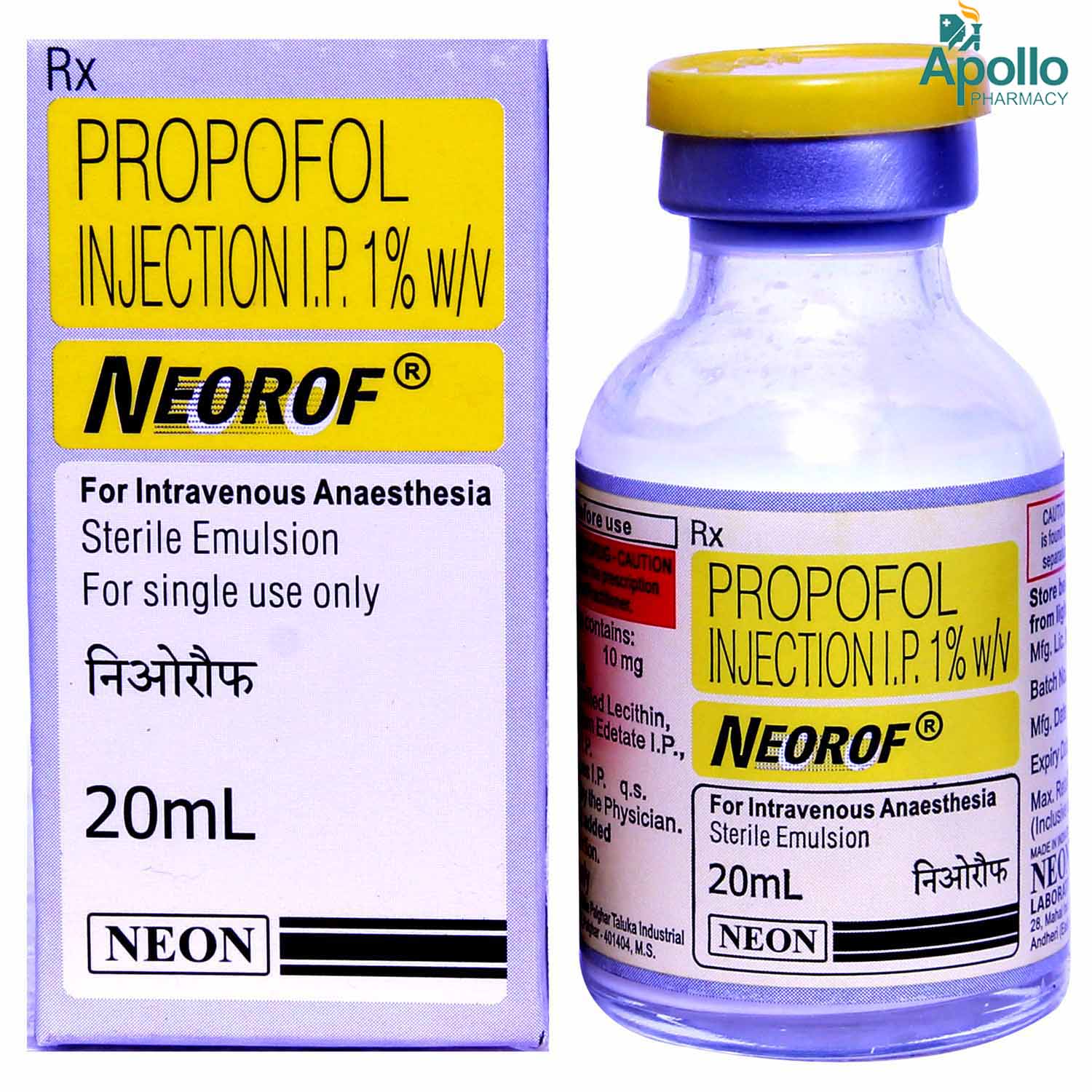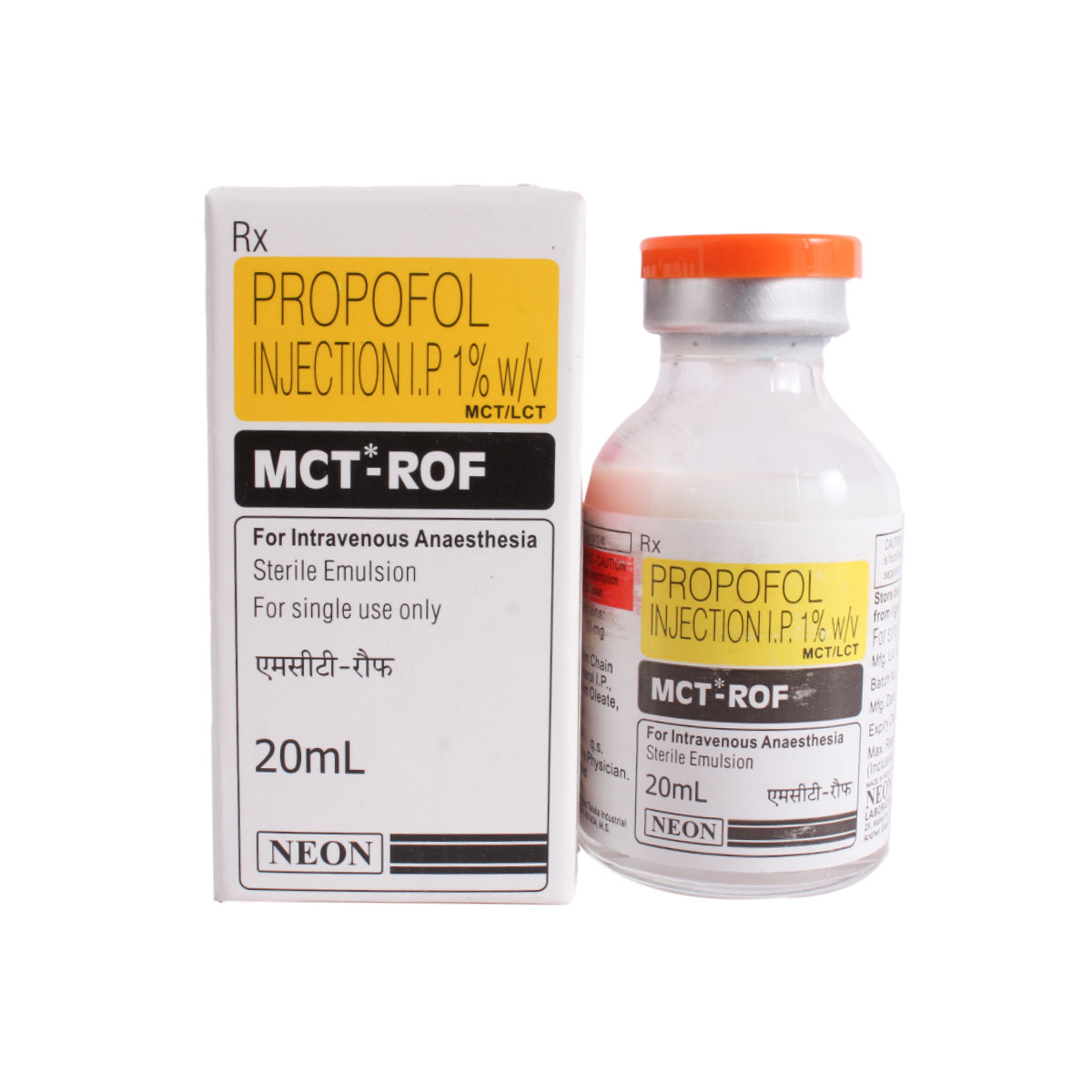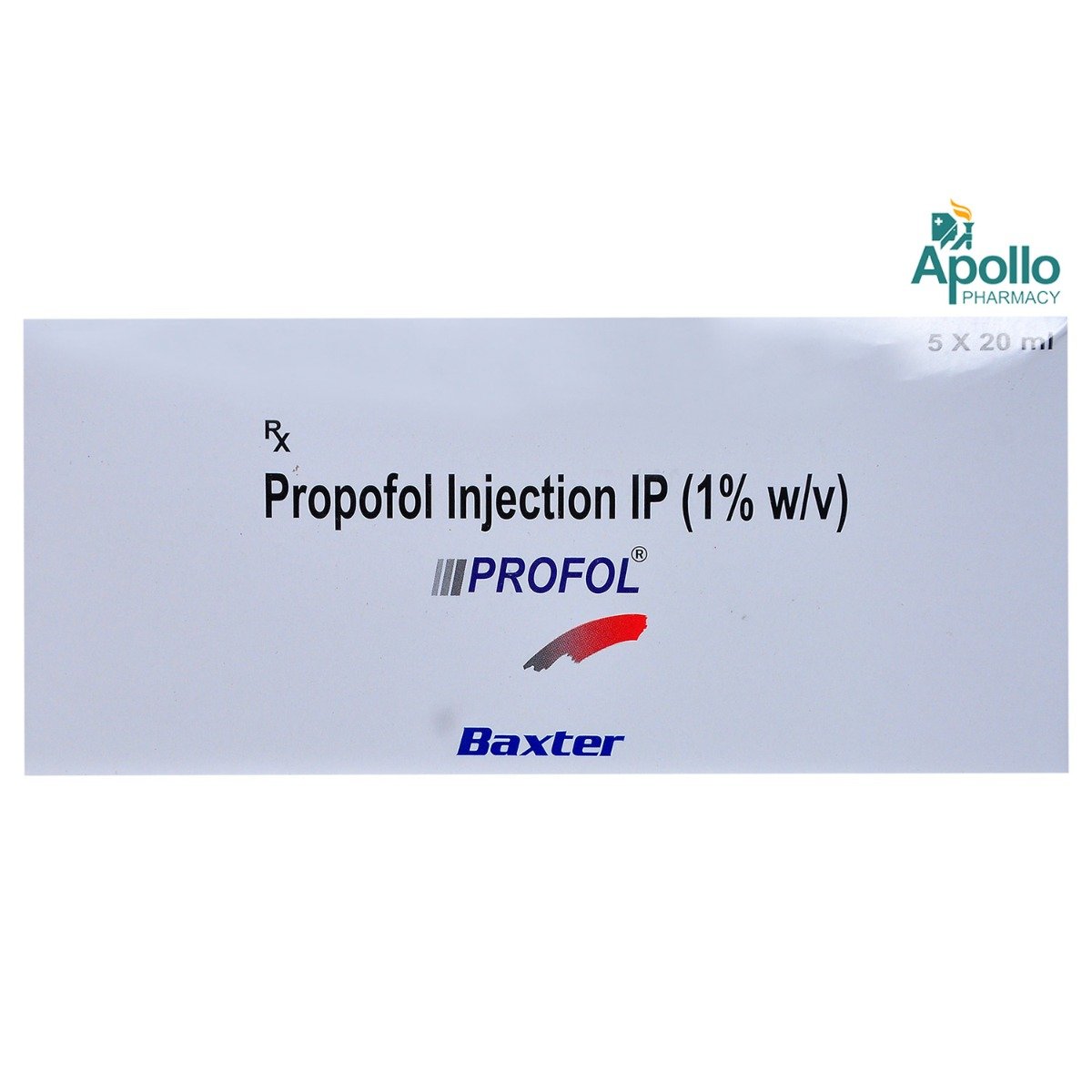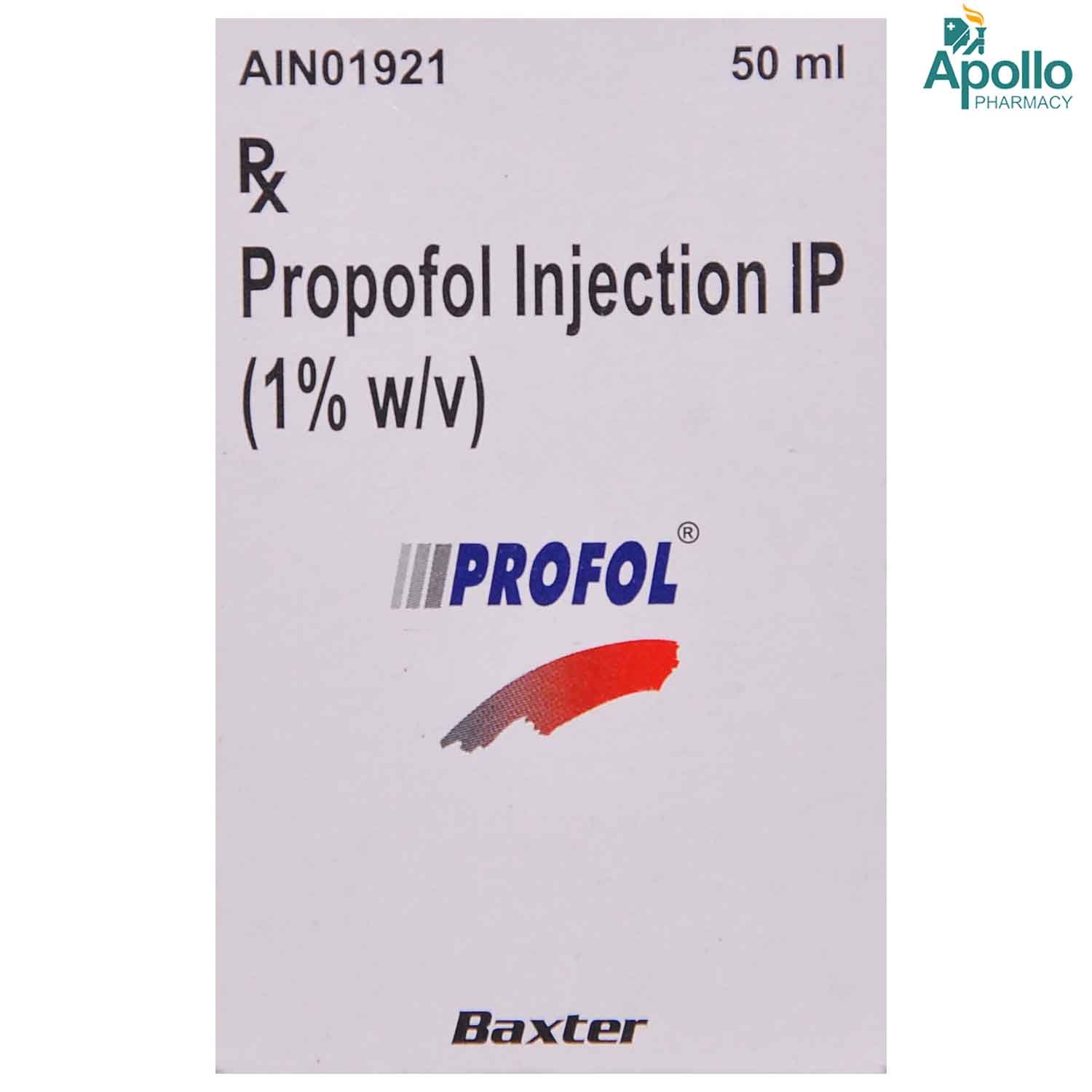- Home
- Profol Spiva 10ml Vial
Profol Spiva 10ml Vial Substitute
Profol Spiva 10ml Vial Substitute
Medicine Composition:
PROPOFOL-10MGAll Substitutes & Brand Comparisons
RX
Not for online saleFresofol 1% Injection 20 ml
Fresenius Kabi India Pvt Ltd
₹136.5
(₹6.01/ 1ml)
68% CHEAPERRX
Not for online saleNeorof Injection 20 ml
Neon Laboratories Ltd
₹136
(₹6.12/ 1ml)
67% CHEAPERRX
Not for online saleMct-Rof 20ml Injection
Neon Laboratories Ltd
₹136
(₹6.12/ 1ml)
67% CHEAPERRX
Out of StockNot for online saleFresofol 10mg Injection 50ml
Fresenius Kabi India Pvt Ltd
₹364
(₹6.55/ 1ml)
65% CHEAPERRX
Out of StockNot for online saleMct-Profol Injection 20 ml
Amneal Healthcare Pvt Ltd
₹136
(₹6.8/ 1ml)
64% CHEAPERRX
Out of StockNot for online salePropaque 1% Injection 20 ml
Samarth Life Sciences Pvt Ltd
₹138.5
(₹6.93/ 1ml)
63% CHEAPERRX
Out of StockNot for online salePropaque 1% Injection 10 ml
Samarth Life Sciences Pvt Ltd
₹72.5
(₹7.25/ 1ml)
61% CHEAPERRX
Out of StockNot for online saleMCT-Profol 500 mg Injection 50 ml
Amneal Healthcare Pvt Ltd
₹364
(₹7.28/ 1ml)
61% CHEAPERRX
Out of StockNot for online salePropaque 1% Injection 50 ml
Samarth Life Sciences Pvt Ltd
₹364
(₹7.28/ 1ml)
61% CHEAPERRX
Out of StockNot for online salePropaque MCT/LCT 1% Injection 20 ml
Samarth Life Sciences Pvt Ltd
₹145.6
(₹7.28/ 1ml)
61% CHEAPERRX
Out of StockNot for online saleProfol Inj 1% - 10Ml
Core Claris Lifesciences Ltd
₹81.07
(₹7.3/ 1ml)
61% CHEAPERRX
Out of StockNot for online salePROFOL INJECTION 1% 20ML
Core Claris Lifesciences Ltd
₹179.5
(₹8.08/ 1ml)
57% CHEAPERRX
Out of StockNot for online saleProfol Injection 1% - 50ml
Core Claris Lifesciences Ltd
₹449
(₹8.08/ 1ml)
57% CHEAPERRX
Out of StockNot for online saleProfol Spiva 1% Injection 50 ml
Claris Lifesciences Ltd
₹545
(₹9.81/ 1ml)
48% CHEAPER

When Should You Consider Switching from Profol Spiva 10ml Vial?
Patients may explore substitutes in the following scenarios:
- High monthly cost of Profol Spiva 10ml Vial
- Non-availability in local pharmacies
- Generic recommendation by a doctor
- Side effects or better tolerability with alternatives
What to Know Before Switching
Before you switch from Profol Spiva 10ml Vial to another medicine, here are some important points to keep in mind:
Same salt, different brands:
Most substitutes contain the same active ingredient - PROPOFOL-10MG, but the fillers, coating, or manufacturing quality may vary slightly.
Consult your doctor first:
Even if the salt is the same, your doctor can confirm if the substitute is right for your condition, dosage, and health history.
Watch out for allergies or reactions:
Some people may react differently to certain brands due to inactive ingredients. If you notice any side effects, inform your doctor immediately.
Price ≠ effectiveness:
A lower-priced substitute doesn't mean it's less effective. Many generic medicines work just as well as branded ones.
Check the dosage form and strength:
Always match the substitute’s strength (e.g., 5mg, 10mg) and form (tablet, capsule, syrup) with what your doctor prescribed.
Uses
Medicinal Benefits
Profol Spiva 10ml Vial belongs to a class of drugs known as 'general anesthetic,' containing Propofol, primarily used in giving anesthesia for major surgical procedures. It allows the procedures to be carried out without pain and distress. It works by causing loss of consciousness, which is reversible. It generally slows down the brain and central nervous system, which is the conscious center. It is also used in people on a ventilator or who need critical care to sedate the patient.
FAQs
The substitutes of Profol Spiva 10ml Vial contain the same active salt(s) - PROPOFOL-10MG. However, they may differ in price, manufacturing quality, and inactive ingredients. Speak to your doctor to find a suitable option.
Switching to a generic substitute medicine in the place of Profol Spiva 10ml Vial is often possible if it has the same salt, strength, and dosage form. But always check with your doctor before making any changes to your medication.
Generics versions of Profol Spiva 10ml Vial are typically more affordable because they don’t include the original brand's research, development, and marketing costs. They contain the same active ingredient and are approved for safety and effectiveness.
Most people don’t notice any difference. However, some may react to different fillers or coatings. If you notice any unusual symptoms after switching, consult your doctor.
Make sure the new medicine has the same active salt, strength, dosage form. Always confirm the change with your doctor or pharmacist.
Substitutes of Profol Spiva 10ml Vial meet the same safety and efficacy standards as Profol Spiva 10ml Vial, but small differences in absorption or formulation can exist. A doctor can help you choose the right one for your needs.
Yes. Substitutes of Profol Spiva 10ml Vial may vary in color, size, or shape due to differences in manufacturing and branding, but this does not affect how they work.
Yes, it’s generally safe to switch between multiple substitutes of Profol Spiva 10ml Vial if they have the same salt and strength. However, always inform your doctor so they can monitor how your body responds.
Yes, many people safely use substitutes of Profol Spiva 10ml Vial for long-term treatment. Just ensure it’s done under medical supervision.
If your symptoms stay under control or lab results remain stable, the substitute for Profol Spiva 10ml Vial is likely working well. Regular follow-ups with your doctor are important.
Absolutely. Even with the same salt, small differences can affect how your body responds when switching from Profol Spiva 10ml Vial to its substitute. Always consult your doctor before switching.
Buy best Anaesthetics products by
Neon Laboratories Ltd
Themis Pharmaceutical Ltd
Troikaa Pharmaceuticals Ltd
Samarth Life Sciences Pvt Ltd
Abbott India Ltd
Astra Zeneca Pharma India Ltd
Baxter India Pvt Ltd
Core Claris Lifesciences Ltd
Celon Laboratories Pvt Ltd
Ajanta Pharma Ltd
Miracalus Pharma Pvt Ltd
Torrent Pharmaceuticals Ltd
Zydus Cadila
AP Pharmaceutical
Fresenius Kabi India Pvt Ltd
Galpha Laboratories Ltd
Indoco Remedies Ltd
Anglo French Drugs & Industries Ltd
B Braun Melsungen AG
Cadila Pharmaceuticals Ltd
Claris Lifesciences Ltd
Dr Reddy's Laboratories Ltd
Elder Pharmaceuticals Ltd
Fortel Life Sciences
Hetero Healthcare Pvt Ltd
Icpa Health Products Ltd
Pure Derma Healthcare Pvt Ltd
Salve Pharmaceuticals Pvt Ltd
Sunways (India) Pvt Ltd
VARENYAM HEALTHCARE PVT LTD
Wockhardt Ltd
Zydus Healthcare Ltd
6Ipain Healthcare Pvt Ltd
Admac Lifesciences(Oncology)
Aesmira Lifesciences Pvt Ltd
Albatross Healthcare Pvt Ltd
Amwill Healthcare Pvt Ltd
Anchal Life Science Pvt Ltd
Atopic laboratories Pvt Ltd
Biovenice Criticure
Cellgen Biopharma
Cipla Ltd
Delvin Formulations (P) Ltd
Entod Pharmaceuticals Ltd
Ethinext Pharma
Foremost Marketing Pvt Ltd
Fusion Health Care Pvt Ltd
German Remedies Ltd
Global Dent Aids Pvt Ltd
Greycells Lifesciences Pvt Ltd
Himeros Pharmaceuticals Pvt Ltd
Ici India Ltd
Icpa Lab
Ikon Remedies Pvt Ltd
Intas Pharmaceuticals Ltd
Kopran Laboratories Ltd
Kshipra Health Solutions
Leeford Healthcare Ltd
MSP Pharmaceuticals
Medimarck Biotech
Modi Mundipharma Pvt Ltd
Mylan Pharmaceuticals Pvt Ltd
Optima Healthcare Solutions
Pericles Pharma
Pharmadent Remedies Pvt Ltd
Piramal Enterprises Ltd
Pristine Pearl Pharma Pvt Ltd
Questus Pharma Pvt Ltd
Ranbaxy Laboratories Ltd
Rusan Healthcare Pvt Ltd
Scott Edil Pharmacia Ltd
Skinocean Pharmaceuticals
Themis Chemicals Ltd
Themis Medicare Ltd
Ultra Drugs Pvt Ltd
Vhb Life Sciences Inc
Zee Laboratories Pvt Ltd








